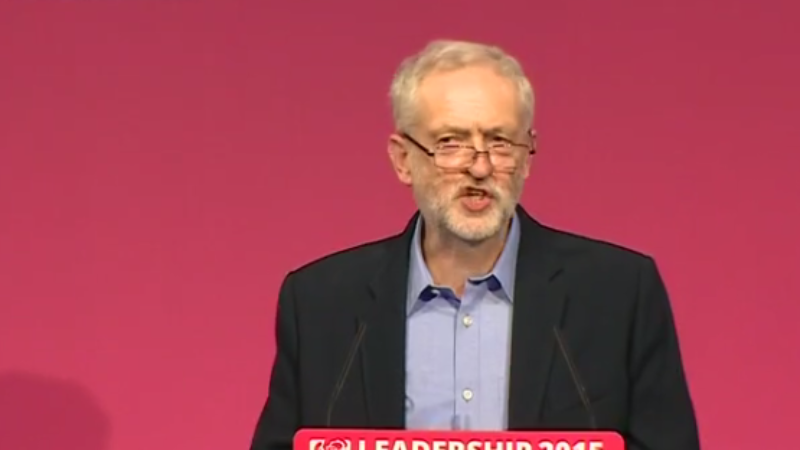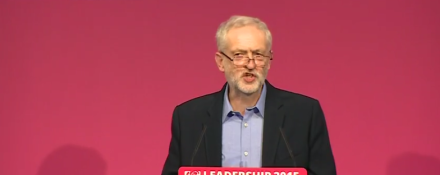
My hunch is the big difference between now and the 1980s, even if the electoral outcome ends up being depressingly similar, is that Labour will stick together. There won’t be an SDP-type breakaway. There is neither political appetite nor organisational and financial capability for anyone to do that, and everyone can see where it ended up last time, with Vince Cable sat in a Tory-led coalition. Any individual defectors are likely to be obscure mavericks. There may not even be any. The one thing that could alter that is if there are sectarian attempts to deselect MPs – if your own party sacks you then you have nothing to gain by staying loyal.

The initial scenario seems to be that Jeremy Corbyn and the non-Corbynite majority in the Parliamentary Labour Party realise they are stuck with each other and have made a series of concessions and compromises to try to ensure some level of party unity.
Corbyn needs the PLP. With only about 20 MPs voting for him, he wouldn’t even be able to construct a frontbench without the participation of MPs who spent the summer trying to stop his election.
The vast majority of the PLP realises it has to accept the huge democratic mandate Corbyn just got. Whilst the PLP has the power to trigger a fresh leadership contest if 20% of Labour MPs nominate a challenger, unless there is a reason for party members and supporters to have changed their minds about the guy they just elected, this is a pointless and indeed self-destructive exercise. The incumbent goes on the ballot without needing to hit any nomination threshold, and Corbyn would get more votes now than he just received as there are a very welcome 60,000 plus new members who signed up in reaction to his victory, and a big chunk of the middle of the party who may not have voted for him but have a sense of fair play and want to give him a chance.
The big concession that many MPs have made is to agree to take up frontbench positions. That’s a political risk for them as it means they will be associated with anything that goes wrong. But many seem to have made clear their policy red lines and won concessions in order to take office. Those MPs that have decided to move to the backbenches because on principle they did not want to be associated with the direction Corbyn is going in, did so largely without grandstanding or detracting from the new leader’s ability to shape his team. Both positions – serving and not-serving – are honourable ones to take.
During this first week Corbyn has made six main concessions to the PLP:
- Clarification that Labour will campaign for a Yes vote in the EU referendum.
- Clarification that he won’t be seeking to take the UK out of NATO.
- Acceptance that he can’t force MPs to vote against Trident renewal next year.
- Disavowal of proposals to bring back mandatory reselection of MPs.
- Appointment of moderates to all the key positions in the Shadow Foreign Affairs and Shadow Defence teams, including Maria Eagle, a multilateralist, as Shadow Defence Secretary.
- Reappointment of the top team in the Whips’ office – Rosie Winterton, Alan Campbell and Mark Tami, who are trusted and respected by MPs and will ensure the whips perform both two-way aspects of the their role – as backbenchers’ voice to the leadership as well as securing votes for what the leadership wants.
The role of Tom Watson as Deputy Leader in restraining Corbyn on policy and in return persuading people to serve and to be constructive seems very apparent.
It’s notable that almost all of these concessions have related to foreign and defence policy where the disagreements are profound ones where the two sides simply have different moral principles.
Where the differences are more of what degree you are along a left-right spectrum and how radical you think it is realistic and electable to be, Corbyn has had more of a free hand to do what he wants.
Hence the early policy pronouncements on rail renationalisation and bringing academies and free schools under LEA control. There will be a small number of Labour MPs who disagree with these on principle, but for the vast majority it will accord with their gut instinct – they might worry about how voters will react, but it is what they personally would like to do.
Hence also the promotion of John McDonnell, one of the few MPs aligned with Corbyn politically, to Shadow Chancellor. This isn’t what MPs wanted – whilst Corbyn is liked on a personal level even by his political opponents, McDonnell is not by his own admission a popular character in the PLP – and Angela Eagle would have been a far more reassuring appointment. But there is a political logic to it that actually appeals to both sides. The core of Corbyn’s appeal in the leadership election was an alternative approach to the economy based on anti-austerity and people’s quantitative easing. It makes sense therefore that he needs an ally who deeply believes in this approach as Shadow Chancellor, and can sell it wholeheartedly to the voters. This also makes sense for the party right, who are now not implicated if it turns out that this new economic message does not work.
What will be interesting will be whether this attempt to find a modus operandi at the high political level in Westminster will filter through to the grassroots when they assemble in Brighton next week for the Annual Conference. I don’t expect people to be horrible to each other – the idiots who insult each other on social media tend not to come to conference, and people will not want to damage the party by airing their differences over-vigorously on camera in the style that was prevalent in the early 1980s. But does the Corbyn operation have a command and control system that will be able to stop his own supporters pushing reference back on the Conference Arrangements Committee Report to force a debate on Birmingham Ladywood CLP’s rule change making it easier to deselect MPs; or to stop his own supporters prioritising a debate on scrapping Trident, a model contemporary resolution the Campaign for Labour Party Democracy has been circulating to CLPs? Or will be wash his hands of it and just say he has to listen to the grassroots?
The tension here will be between those of his advisors who have come out of the Socialist Action group and Ken Livingstone’s City Hall administration, who are pragmatists who are interested in securing and wielding power through compromise, and also used to working with forces to their right in the Labour Party, and the organisers of the grassroots CLPD and LRC networks who will want to push forward at top speed with constitutional and policy changes they have campaigned for since the 1970s.
Longer-term, Corbyn’s leadership will sink or swim inside the party on whether it works electorally.
If it does, the bulk of un-ideological MPs, trade unionists and members will be delighted that their hearts turned out to have a better understanding of the British electorate than their heads and conventional wisdom did.
If conventional wisdom does prove correct, and Corbyn doesn’t play well in the various sets of elections each May, eventually three changes will happen:
- Some of his grassroots supporters will go through the same painful process of awakening and political education that led to many Bennite activists becoming successively Kinnockite then Blairite in the 1980s and 1990s. Their idealism didn’t survive repeated interaction with electoral defeat and hostile working class voters on the doorstep. It’s natural to want to win. And people get older and in many cases their politics matures.
- Trade unions will get fed up with not being able to deliver on pay and conditions and public spending for their public sector members because we don’t have a Labour government (they may also get jittery if we lose councils as they would prefer to negotiate with Labour employers not Tories).
- MPs will feel they have to act or the electorate will sack them.
Of course a third scenario is possible. Corbyn does OK in mid-term elections each May as these are low turnout elections where you can win by having large numbers of enthused activists to do Get Out the Vote and a highly motivated core vote, but then the party gets a nasty surprise in the 2020 General Election when the turnout is higher. This would be ironic given Corbyn’s electoral strategy is based on mobilising current non-voters.




More from LabourList
Letters to the Editor – week ending 14 December 2025
‘Like changes to winter fuel allowance, lifting the two-child cap may be easy in Parliament — and risky everywhere else’
‘No racist is going to make me feel I don’t belong’: Shabana Mahmood on resilience, faith and public service